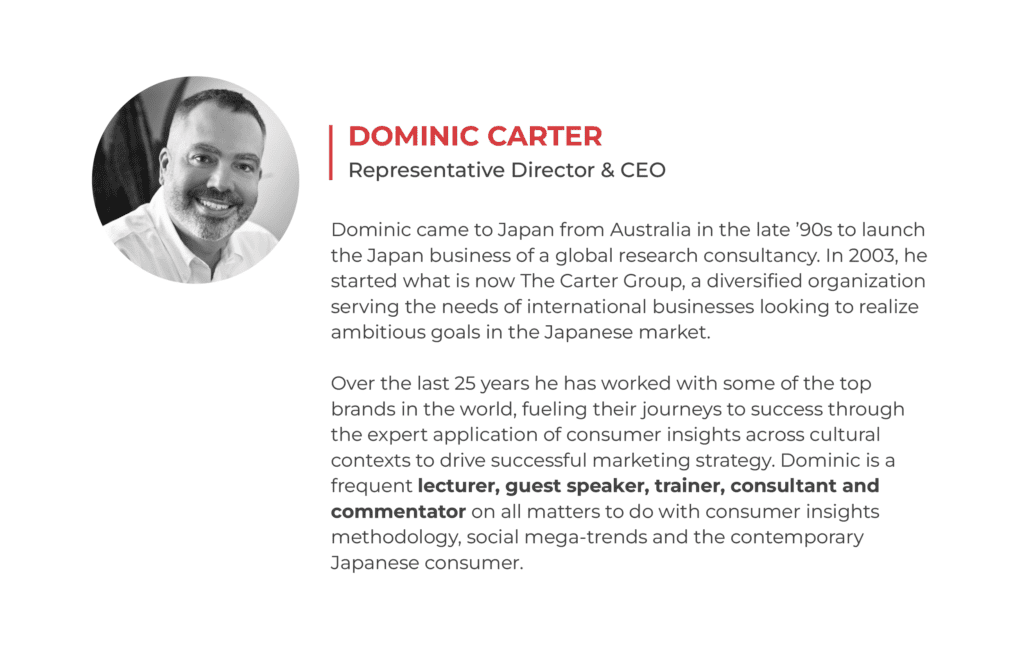日本は、欧米諸国が社会的近代化の一環として取り入れてきた様々な思想や改革に背を向けるような姿勢を取っている。たとえば、女性管理職の採用一つとっても、明らかに消極的であり、諸外国に数十年の遅れを取っているのが現状だ。

一方で、日本人の変化に対する受容性は想像以上に高い。今年初頭に、当社では16~69歳の日本人を対象にアンケート調査を実施し、様々な考え方や価値観を表す60個のステートメントに対する意見聴取を行った。調査結果から得られた社会的価値観に関する貴重なデータをもとに、今後数ヶ月のうちに報告書をまとめるつもりである。
短報ではあるが、日本人が支持するステートメント上位10個を紹介することで、2021年現在の「今の日本」の実状について分析したい。驚くべきことに、彼らの考え方や価値観には大幅な進歩が見られている。以下、パーセンテージで示される数値は、ステートメントに対する同意の割合から非同意の割合を引いた数値である。数値が高ければ高いほど、そのステートメントが広く受け入れられており、また偏りがないことを示す。本調査では、60から9の範囲に収まった。

「自分の行動には責任を持つべきである」60%
日本人の自己責任を重視する考え方は軽視できないほど広く浸透している。職場でも家庭においても過度なコミットメントを果たそうとする日本人の姿は多くの調査からもうかがえる結果となっている。こうした自己責任の意識は、他者に対しても同じレベルの責任を求める傾向につながる恐れがあり、「誰かがやってくれる」という他責思考は社会全体に悪影響を及ぼしかねない。大企業や政府が倫理に反することや無責任な行動を取っていたとしても、無条件に信用してしまう心理にはこうした思考が潜んでいる。
“Domestic violence is a topic that should be tackled head on” 54%
This is a strong indication that women’s issues are heading more to the fore of the social conversation. While views can still vary on women’s role in the workforce, it is now widely viewed as completely unacceptable that women should suffer a subservient and vulnerable role at home. This may sound like old news, but in fact the mere visibility and acknowledgement of the issue is a sign of movement. The mega-trend of the changing role of women represents a major force for change, and women will inevitably become progressively more powerful in Japanese society.
“Workers need protection from unscrupulous employers” 54%
“ I support a flexible workplace in Japan” 49%
“In general the level of wages needs to rise” 47%
The changing world of work is another key mega-trend that has been turbocharged by the prolonged pandemic. Falling workforce numbers are giving employees much more power than in the past; employers will increasingly be forced to provide better pay and benefits. Wages are currently seen as being too low – not only by employees but also by the government. For the professional, administrative, creative and managerial classes, working from home will continue to be part of the work repertoire. As in the rest of the world, employers failing to recognise this will not attract the best talent.
One particularly interesting anomaly is the relatively low net agreement on the point (“The most qualified person should always get the job 16%”). This possibly speaks to very ingrained attitudes to how and why progress happens within organisations – most probably age-based seniority.
“The challenge of climate change is one of the most important that we face as a planet” 48%
There is high awareness and concern about climate change in Japan. The image of Japanese as being indifferent to the environment is an increasingly outdated one. Indeed sustainability and the environment is showing signs of emergence as a genuine megatrend.
Nevertheless, people lack confidence in their personal ability to affect positive change. Organisations and brands that wish to leverage high levels of concern need to deeply think about ways to break the problem down into smaller, addressable actions. My Mizu, a recent start-up that provides a refilling service for water bottles at a range of locations across Tokyo is a great example of how to do this well.
“The government and business should do what is right for society rather than what is expedient” 47%
Notwithstanding the already-mentioned high levels of trust, people are firm in their conviction that the powers that be should look after the common good. The recent decision to hold the Olympics in Tokyo is one that is generally seen to fly in the face of this unwritten social contract. Watch this space as to how that plays out.
“Japan is in danger of being exploited by outside forces” 46%
This may be an obvious factual statement for many – Japan’s history shows the risks of a troubled geopolitical environment, one which we are increasingly facing. However, there is quite a high degree of discomfort around another of Japan’s mega-trends, that of internationalisation. Coupled with this result we only saw net agreement of 9% for the statement “I am happy to see more foreigners living permanently in Japan”. The path to internationalisation is going to be long and difficult, but one that is demographically inevitable. People not born in Japan will live here in much greater numbers in the future because even with a revolution in robotics and productivity, Japan will not have the workforce to meet its needs.
“Society needs to have more respect for the individual” 46%
In the question of balance between individual vs. society, it has always been a given that Japan leans towards society. This may, however, be far less the case than foreigners think. Certainly, elements of Japan’s progressiveness involve more freedom to think and make decisions on one’s own. Greater demands for ‘me’ and ‘my’ priorities will play out strongly in the role of women as well as in the world of work. Japan will gradually resemble other advanced nations in terms of the consideration given to the individual.
“Innovation is the key need to keep society afloat” 45%
While not a panacea, innovation will assist Japan in facing many of its challenges. Not least is the ageing of society, which is inextricably interwoven with the mega-trend of generational dynamics. Innovations such as robotics and autonomous cars promise to make ageing in place and elements of maintaining normal life much more feasible than today, but in order to meet the challenges of the country, innovations will need to be social as well as technical.
The progressive dimensions endorsed by many in our survey give us a somewhat positive view of society’s readiness to change to meet the challenges of the 21st century. There are speedbumps implied in our survey, such as Japan’s relatively defensive attitude to internationalisation and its traditional work culture. Nonetheless the nation continues its positive movement on these points, albeit on its own terms. This slower pace of change, on balance, is seen by most Japanese as being for the best.


